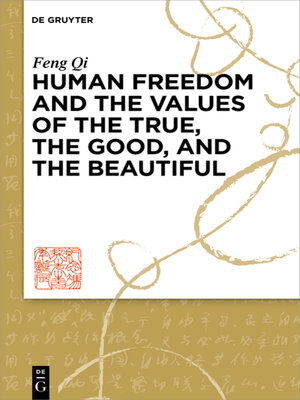
Sign up to save your library
With an OverDrive account, you can save your favorite libraries for at-a-glance information about availability. Find out more about OverDrive accounts.
Find this title in Libby, the library reading app by OverDrive.



Search for a digital library with this title
Title found at these libraries:
| Library Name | Distance |
|---|---|
| Loading... |
This is a philosophical book about the idea of human freedom in the context of Chinese philosophy on truth, the good, and beauty. The book shows that there is a coherent and sophisticated philosophical discourse on human freedom throughout the history of Chinese Philosophy in aesthetics, ethics, and epistemology. Feng Qi discusses the development of freedom in light of the Marxist theory of practice.
In the history of philosophy, the relation between thought and existence, which is fundamental to philosophy, has stimulated many debates. These debates, though they have assumed diverse forms in Chinese and Western philosophy, have eventually concentrated on three inquiries: the natural world (the objective material world); the human mind; and the concepts, categories, and laws that are representative forms of nature in the human mind and in knowledge. In Chinese philosophy, the three inquiries are summarized using three notions: qi (气 breath, spirit), xin (心 heart), dao (道 the Way). What relationship do the three notions have with each other? This book explores the way to human freedom through the divergent paths in Chinese philosophy.
This book's investigation of human activities brings the typical Chinese philosophical discourse from the cosmological realm into the realm of human beings as individuals. In this regard, the three inquiries can be described as being about real life, ideals, and individuals.
In the history of philosophy, the relation between thought and existence, which is fundamental to philosophy, has stimulated many debates. These debates, though they have assumed diverse forms in Chinese and Western philosophy, have eventually concentrated on three inquiries: the natural world (the objective material world); the human mind; and the concepts, categories, and laws that are representative forms of nature in the human mind and in knowledge. In Chinese philosophy, the three inquiries are summarized using three notions: qi (气 breath, spirit), xin (心 heart), dao (道 the Way). What relationship do the three notions have with each other? This book explores the way to human freedom through the divergent paths in Chinese philosophy.
This book's investigation of human activities brings the typical Chinese philosophical discourse from the cosmological realm into the realm of human beings as individuals. In this regard, the three inquiries can be described as being about real life, ideals, and individuals.







